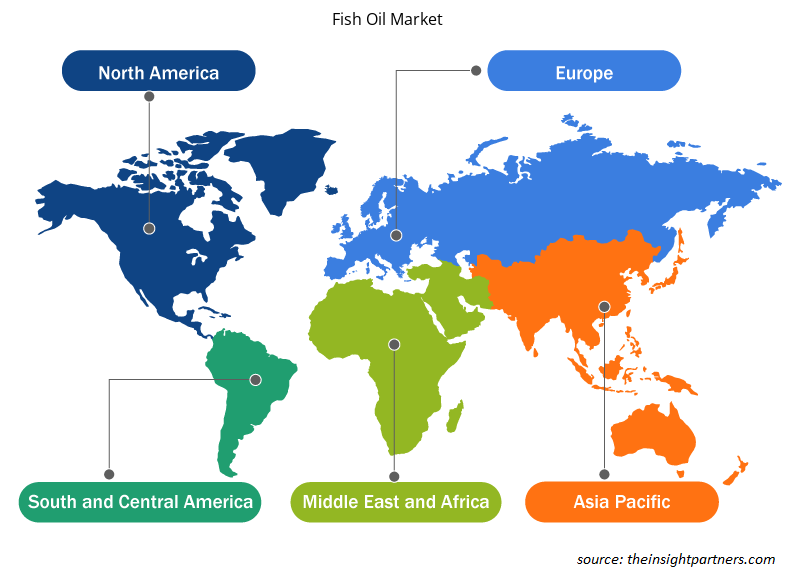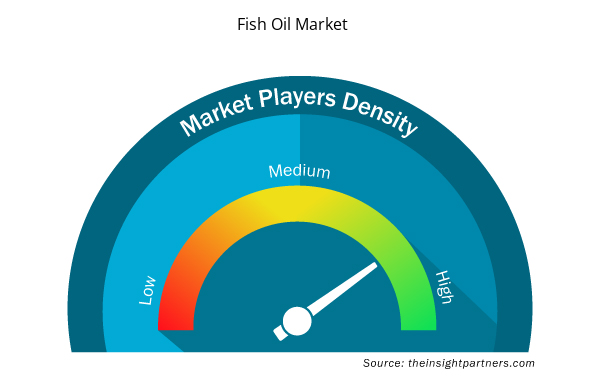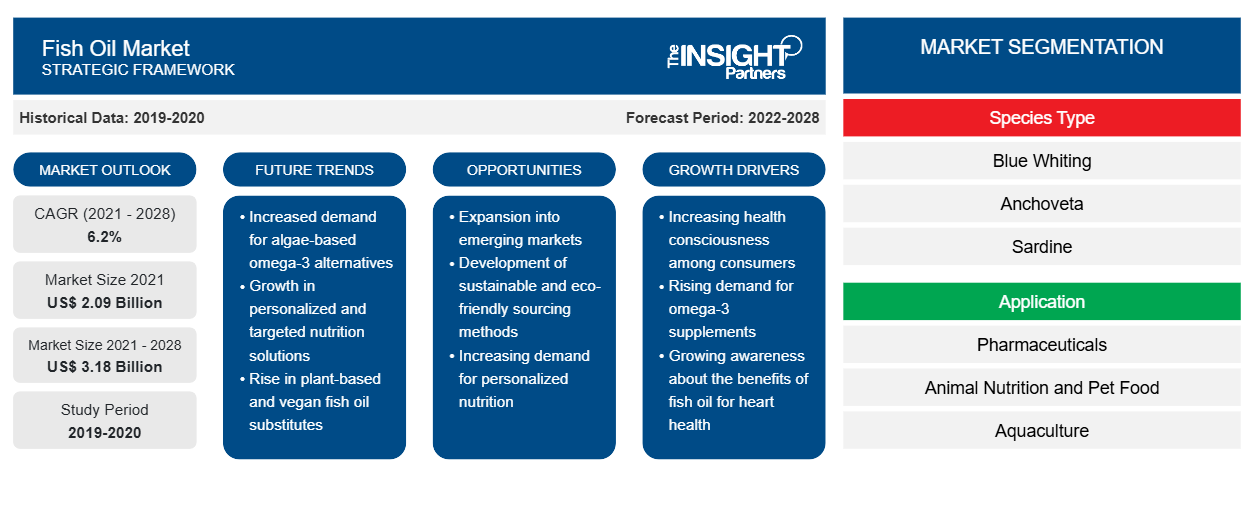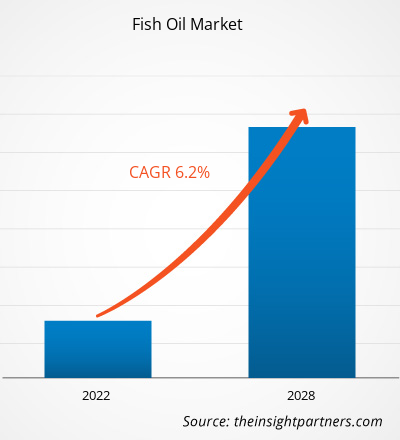Il mercato dell'olio di pesce è stato valutato a 2.087,39 milioni di dollari nel 2021 e si prevede che raggiungerà i 3.178,28 milioni di dollari entro il 2028. Si prevede che crescerà a un CAGR del 6,2% dal 2021 al 2028.
L'olio di pesce è ricavato dai tessuti di varie specie di pesci e contiene acidi grassi omega-3, come gli acidi eicosapentaenoici (EPA) e docosaesaenoici (DHA). Offrono vari benefici per la salute, tra cui un rischio ridotto di morte per infarto, pericolosi ritmi cardiaci anormali, trigliceridi abbassati e ictus.
Nel 2020, l'Asia Pacifica ha dominato il mercato globale dell'olio di pesce e si prevede che manterrà il suo predominio durante il periodo di previsione. La crescente consapevolezza relativa ai benefici per la salute e al ricco profilo nutrizionale dell'olio di pesce sta guidando la crescita del mercato dell'olio di pesce in tutta la regione. Insieme a questo, la maggiore prevalenza di malattie croniche in vari paesi della regione sta portando a una maggiore domanda di olio di pesce. Ad esempio, in Australia, si stima che il cinquanta percento degli australiani abbia almeno 1 delle 8 condizioni croniche comuni selezionate: cancro, malattie cardiovascolari, condizioni di salute mentale, artrite, mal di schiena e problemi, malattia polmonare ostruttiva cronica, asma e diabete. Si prevede che questi fattori favoriranno la crescita della domanda di olio di pesce in tutta la regione.
Personalizza questo report in base alle tue esigenze
Riceverai la personalizzazione gratuita di qualsiasi report, comprese parti di questo report, o analisi a livello nazionale, pacchetto dati Excel, oltre a usufruire di grandi offerte e sconti per start-up e università
- Scopri le principali tendenze di mercato in questo rapporto.Questo campione GRATUITO includerà analisi di dati che spaziano dalle tendenze di mercato alle stime e alle previsioni.
Approfondimenti di mercato
Ampia gamma di applicazioni dell'olio di pesce in diversi settori
L'olio di pesce è sempre più utilizzato in vari settori, come quello farmaceutico, degli integratori alimentari , della nutrizione animale e del cibo per animali . Trova un'applicazione significativa nei prodotti farmaceutici ed è considerato olio naturale o concentrati di EPA-DHA. È anche utilizzato per l'alimentazione animale in quanto fornisce effetti di promozione della crescita ed è una fonte di energia poco costosa. Oltre a questo, è anche utilizzato nel cibo per animali e aiuta a rafforzare il sistema immunitario dei cani, mentre aiuta anche a combattere il cancro canino. L'olio di pesce è anche utilizzato come integratore alimentare in cui le capsule sono tradizionalmente realizzate utilizzando gelatina che ricopre l'olio nelle capsule soft-gel. Pertanto, l'utilizzo dell'olio di pesce in diversi settori sta guidando la crescita del mercato dell'olio di pesce.
Approfondimenti sul tipo di specie
In base al tipo di specie, il mercato dell'olio di pesce è diviso in melù, acciuga, sardina, capelin e altri. Nel 2020, il segmento delle sardine è stato quello in più rapida crescita nel mercato. La sardina è un piccolo pesce simile all'aringa con vari benefici nutrizionali simili ad altri pesci come il salmone. L'olio estratto dalla sardina è anche usato come lubrificante e viene utilizzato principalmente in vernici, vernici, biocarburanti e linoleum.
Pesquera Exalmar SAA; Omega Protein Corporation; Pelagia AS; Copeinca; Coplex International SAC; Triplenine; FF Skagen A/S; DSM; Croda International PLC; e BASF SE sono i principali attori che operano nel mercato dell'olio di pesce. I principali attori adottano diverse strategie, come fusioni e acquisizioni e lanci di prodotti, per espandere la loro presenza geografica e la base di consumatori.
Segnala i riflettori
- Tendenze progressive nel settore dell'olio di pesce per aiutare i giocatori a sviluppare strategie efficaci a lungo termine
- Strategie di crescita aziendale adottate dalle aziende per garantire la crescita nei mercati sviluppati e in via di sviluppo
- Analisi quantitativa del mercato globale dell'olio di pesce dal 2019 al 2028
- Stima della domanda di olio di pesce nei vari settori industriali
- Analisi di Porter per illustrare l'efficacia degli acquirenti e dei fornitori che operano nel settore nel prevedere la crescita del mercato
- Sviluppi recenti per comprendere lo scenario competitivo del mercato e la domanda di olio di pesce
- Tendenze e prospettive del mercato, insieme ai fattori che guidano e frenano la crescita del mercato dell'olio di pesce
- Comprensione delle strategie che sostengono l'interesse commerciale in relazione alla crescita del mercato globale dell'olio di pesce, aiutando nel processo decisionale
- Dimensioni del mercato dell'olio di pesce nei vari nodi del mercato
- Panoramica dettagliata e segmentazione del mercato globale dell'olio di pesce nonché delle sue dinamiche di settore
- Dimensioni del mercato dell'olio di pesce in varie regioni con promettenti opportunità di crescita
Approfondimenti regionali sul mercato dell'olio di pesce
Le tendenze regionali e i fattori che influenzano il mercato dell'olio di pesce durante il periodo di previsione sono stati ampiamente spiegati dagli analisti di Insight Partners. Questa sezione discute anche i segmenti e la geografia del mercato dell'olio di pesce in Nord America, Europa, Asia Pacifico, Medio Oriente e Africa e America meridionale e centrale.

- Ottieni i dati specifici regionali per il mercato dell'olio di pesce
Ambito del rapporto sul mercato dell'olio di pesce
| Attributo del report | Dettagli |
|---|---|
| Dimensioni del mercato nel 2021 | 2,09 miliardi di dollari USA |
| Dimensioni del mercato entro il 2028 | 3,18 miliardi di dollari USA |
| CAGR globale (2021 - 2028) | 6,2% |
| Dati storici | 2019-2020 |
| Periodo di previsione | 2022-2028 |
| Segmenti coperti | Per tipo di specie
|
| Regioni e Paesi coperti | America del Nord
|
| Leader di mercato e profili aziendali chiave |
|
Densità degli operatori del mercato dell'olio di pesce: comprendere il suo impatto sulle dinamiche aziendali
Il mercato dell'olio di pesce sta crescendo rapidamente, spinto dalla crescente domanda degli utenti finali dovuta a fattori quali l'evoluzione delle preferenze dei consumatori, i progressi tecnologici e una maggiore consapevolezza dei benefici del prodotto. Con l'aumento della domanda, le aziende stanno ampliando le loro offerte, innovando per soddisfare le esigenze dei consumatori e capitalizzando sulle tendenze emergenti, il che alimenta ulteriormente la crescita del mercato.
La densità degli operatori di mercato si riferisce alla distribuzione di aziende o società che operano in un particolare mercato o settore. Indica quanti concorrenti (operatori di mercato) sono presenti in un dato spazio di mercato in relazione alle sue dimensioni o al valore di mercato totale.
Le principali aziende che operano nel mercato dell'olio di pesce sono:
- PESQUERA EXALMAR SAA
- CORPORAZIONE DI PROTEINE OMEGA
- PELAGIA COME
- COPPAINCA
- COPLEX INTERNAZIONALE SAC
Disclaimer : le aziende elencate sopra non sono classificate secondo un ordine particolare.

- Ottieni una panoramica dei principali attori del mercato dell'olio di pesce
"Global Fish Oil Market Analysis to 2028" è uno studio specializzato e approfondito del settore alimentare e delle bevande con un'attenzione particolare all'analisi delle tendenze del mercato globale dell'olio di pesce. Il rapporto mira a fornire una panoramica del mercato con una segmentazione dettagliata del mercato. Il mercato dell'olio di pesce è analizzato su tre fronti: tipo di specie, applicazione e geografia. In base al tipo di specie, il mercato è suddiviso in melù, acciughe, sardine, capelin e altri. In base all'applicazione, il mercato dell'olio di pesce è suddiviso in prodotti farmaceutici, nutrizione animale e cibo per animali domestici, acquacoltura, integratori alimentari e altri. In base alla geografia, il mercato dell'olio di pesce è segmentato in cinque regioni principali: Nord America, Europa, Asia-Pacifico, Medio Oriente e Africa e Sud e Centro America.
Profili aziendali
- BASF SE
- Copeinca
- Coplex SAC Internazionale
- Croda International PLC
- Il DSM-5
- FF Skagen A/S
- Società proteica Omega
- Pelagia AS
- Pesca Exalmar SAA
- Triplo nove
- Analisi storica (2 anni), anno base, previsione (7 anni) con CAGR
- Analisi PEST e SWOT
- Valore/volume delle dimensioni del mercato - Globale, regionale, nazionale
- Industria e panorama competitivo
- Set di dati Excel



Report Coverage
Revenue forecast, Company Analysis, Industry landscape, Growth factors, and Trends

Segment Covered
This text is related
to segments covered.

Regional Scope
North America, Europe, Asia Pacific, Middle East & Africa, South & Central America

Country Scope
This text is related
to country scope.
Domande frequenti
Based on species type, the sardine segment was the fastest-growing segment in the market. Sardine is a small, herring-like fish with various nutritional benefits similar to other species such as salmon. The oil extracted from sardine is also used as a lubricant and is mostly used in paints, varnishes, biofuels, and linoleum.
In 2020, the blue whiting segment accounted for the largest fish oil market share, based on species type. Blue whiting is one of the cod family species and one of the most abundant fish stocks in the semi-pelagic water masses of the Northeast Atlantic. The fish oil derived from blue whiting is a potential source of omega-3 fatty acids.
The market for the pharmaceuticals segment is expected to grow at a faster pace during the forecast period. In various countries, such as Japan, the consumption of nutritional and pharmaceutical-grade fish oil is significantly increasing due to the surge in the presence of the geriatric population, which is likely to result in the rise in demand for pharmaceutical-grade fish oil for various health benefits.
Fish oil is associated with various health benefits and helps in reducing the risk of cardiovascular diseases, lowers blood pressure, and slows the buildup of atherosclerotic plaques. Fish oil is also considered one of the valuable nutrients for both humans and livestock. Fish liver oil and fish body oil are the two types of fish oil. Fish oil is a rich source of Omega-3 fatty acids and includes the presence of vitamins and minerals, such as vitamin A and vitamin D, which are essential for the human body. In addition, the DHA present in fish oil improves memory and cognitive function and plays an important role in the development of an infant's brain. Thus, such health benefits are increasing the demand for fish oil across the world.
The major key players operating in the global fish oil market include Pesquera Exalmar S.A.A.; Omega Protein Corporation; Pelagia AS; Copeinca; Coplex International S.A.C; Triplenine; FF Skagen A/S; DSM; Croda International PLC; and BASF SE.
In 2020, Asia Pacific dominated the global fish oil market. The region is expected to continue its dominance during the forecast period. Trends in this market are influenced by the increasing awareness about the health benefits of omega-3, present abundantly in fish oil. Omega-3 fatty acids are beneficial for the geriatric population as it helps in reducing the risk of chronic diseases and provide preventive measures in terms of heart, cognitive, eye, and joint deterioration.
Trends and growth analysis reports related to Consumer Goods : READ MORE..
The List of Companies - Global Fish Oil Market
- PESQUERA EXALMAR S.A.A.
- OMEGA PROTEIN CORPORATION
- PELAGIA AS
- COPEINCA
- COPLEX INTERNATIONAL S.A.C
- TRIPLENINE
- FF SKAGEN A/S
- DSM
- CRODA INTERNATIONAL PLC
- BASF SE
The Insight Partners performs research in 4 major stages: Data Collection & Secondary Research, Primary Research, Data Analysis and Data Triangulation & Final Review.
- Data Collection and Secondary Research:
As a market research and consulting firm operating from a decade, we have published and advised several client across the globe. First step for any study will start with an assessment of currently available data and insights from existing reports. Further, historical and current market information is collected from Investor Presentations, Annual Reports, SEC Filings, etc., and other information related to company’s performance and market positioning are gathered from Paid Databases (Factiva, Hoovers, and Reuters) and various other publications available in public domain.
Several associations trade associates, technical forums, institutes, societies and organization are accessed to gain technical as well as market related insights through their publications such as research papers, blogs and press releases related to the studies are referred to get cues about the market. Further, white papers, journals, magazines, and other news articles published in last 3 years are scrutinized and analyzed to understand the current market trends.
- Primary Research:
The primarily interview analysis comprise of data obtained from industry participants interview and answers to survey questions gathered by in-house primary team.
For primary research, interviews are conducted with industry experts/CEOs/Marketing Managers/VPs/Subject Matter Experts from both demand and supply side to get a 360-degree view of the market. The primary team conducts several interviews based on the complexity of the markets to understand the various market trends and dynamics which makes research more credible and precise.
A typical research interview fulfils the following functions:
- Provides first-hand information on the market size, market trends, growth trends, competitive landscape, and outlook
- Validates and strengthens in-house secondary research findings
- Develops the analysis team’s expertise and market understanding
Primary research involves email interactions and telephone interviews for each market, category, segment, and sub-segment across geographies. The participants who typically take part in such a process include, but are not limited to:
- Industry participants: VPs, business development managers, market intelligence managers and national sales managers
- Outside experts: Valuation experts, research analysts and key opinion leaders specializing in the electronics and semiconductor industry.
Below is the breakup of our primary respondents by company, designation, and region:

Once we receive the confirmation from primary research sources or primary respondents, we finalize the base year market estimation and forecast the data as per the macroeconomic and microeconomic factors assessed during data collection.
- Data Analysis:
Once data is validated through both secondary as well as primary respondents, we finalize the market estimations by hypothesis formulation and factor analysis at regional and country level.
- Macro-Economic Factor Analysis:
We analyse macroeconomic indicators such the gross domestic product (GDP), increase in the demand for goods and services across industries, technological advancement, regional economic growth, governmental policies, the influence of COVID-19, PEST analysis, and other aspects. This analysis aids in setting benchmarks for various nations/regions and approximating market splits. Additionally, the general trend of the aforementioned components aid in determining the market's development possibilities.
- Country Level Data:
Various factors that are especially aligned to the country are taken into account to determine the market size for a certain area and country, including the presence of vendors, such as headquarters and offices, the country's GDP, demand patterns, and industry growth. To comprehend the market dynamics for the nation, a number of growth variables, inhibitors, application areas, and current market trends are researched. The aforementioned elements aid in determining the country's overall market's growth potential.
- Company Profile:
The “Table of Contents” is formulated by listing and analyzing more than 25 - 30 companies operating in the market ecosystem across geographies. However, we profile only 10 companies as a standard practice in our syndicate reports. These 10 companies comprise leading, emerging, and regional players. Nonetheless, our analysis is not restricted to the 10 listed companies, we also analyze other companies present in the market to develop a holistic view and understand the prevailing trends. The “Company Profiles” section in the report covers key facts, business description, products & services, financial information, SWOT analysis, and key developments. The financial information presented is extracted from the annual reports and official documents of the publicly listed companies. Upon collecting the information for the sections of respective companies, we verify them via various primary sources and then compile the data in respective company profiles. The company level information helps us in deriving the base number as well as in forecasting the market size.
- Developing Base Number:
Aggregation of sales statistics (2020-2022) and macro-economic factor, and other secondary and primary research insights are utilized to arrive at base number and related market shares for 2022. The data gaps are identified in this step and relevant market data is analyzed, collected from paid primary interviews or databases. On finalizing the base year market size, forecasts are developed on the basis of macro-economic, industry and market growth factors and company level analysis.
- Data Triangulation and Final Review:
The market findings and base year market size calculations are validated from supply as well as demand side. Demand side validations are based on macro-economic factor analysis and benchmarks for respective regions and countries. In case of supply side validations, revenues of major companies are estimated (in case not available) based on industry benchmark, approximate number of employees, product portfolio, and primary interviews revenues are gathered. Further revenue from target product/service segment is assessed to avoid overshooting of market statistics. In case of heavy deviations between supply and demand side values, all thes steps are repeated to achieve synchronization.
We follow an iterative model, wherein we share our research findings with Subject Matter Experts (SME’s) and Key Opinion Leaders (KOLs) until consensus view of the market is not formulated – this model negates any drastic deviation in the opinions of experts. Only validated and universally acceptable research findings are quoted in our reports.
We have important check points that we use to validate our research findings – which we call – data triangulation, where we validate the information, we generate from secondary sources with primary interviews and then we re-validate with our internal data bases and Subject matter experts. This comprehensive model enables us to deliver high quality, reliable data in shortest possible time.


 Ottieni un campione gratuito per questo repot
Ottieni un campione gratuito per questo repot